
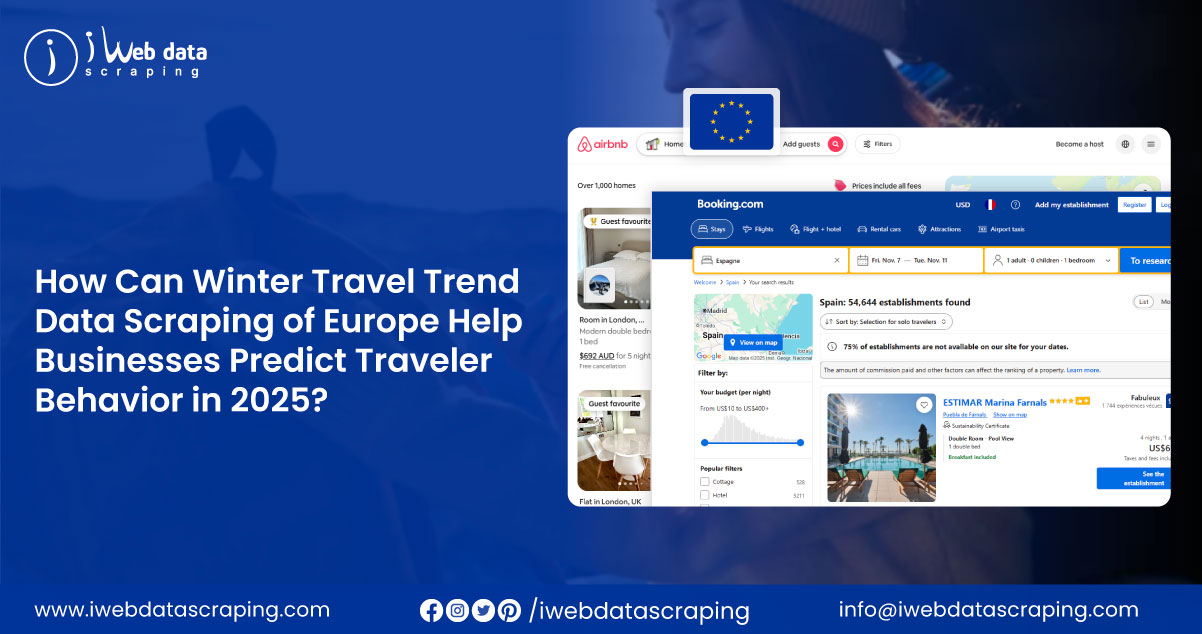
Europe in winter feels like stepping into a fairy tale — glittering lights, snow-laden rooftops, steaming cups of mulled wine, and cozy cottages that invite travelers from across the world. Behind this magical picture lies a world of data that tells stories of where travelers go, how much they spend, and what experiences they crave. Through winter travel trend data scraping of Europe, travel businesses and analysts can decode these behaviors, revealing how demand, pricing, and traveler preferences evolve during the coldest months of the year.
The power of method to Scrape Europe winter travel trends 2025 lies in its ability to uncover hidden patterns — from how early travelers start booking ski lodges to which European capitals see the highest Airbnb occupancy rates in December. Meanwhile, scraping Airbnb Europe data gives hospitality brands a competitive advantage, showing them how accommodation prices fluctuate across France, Switzerland, and Germany as travelers chase winter adventures and festive experiences.
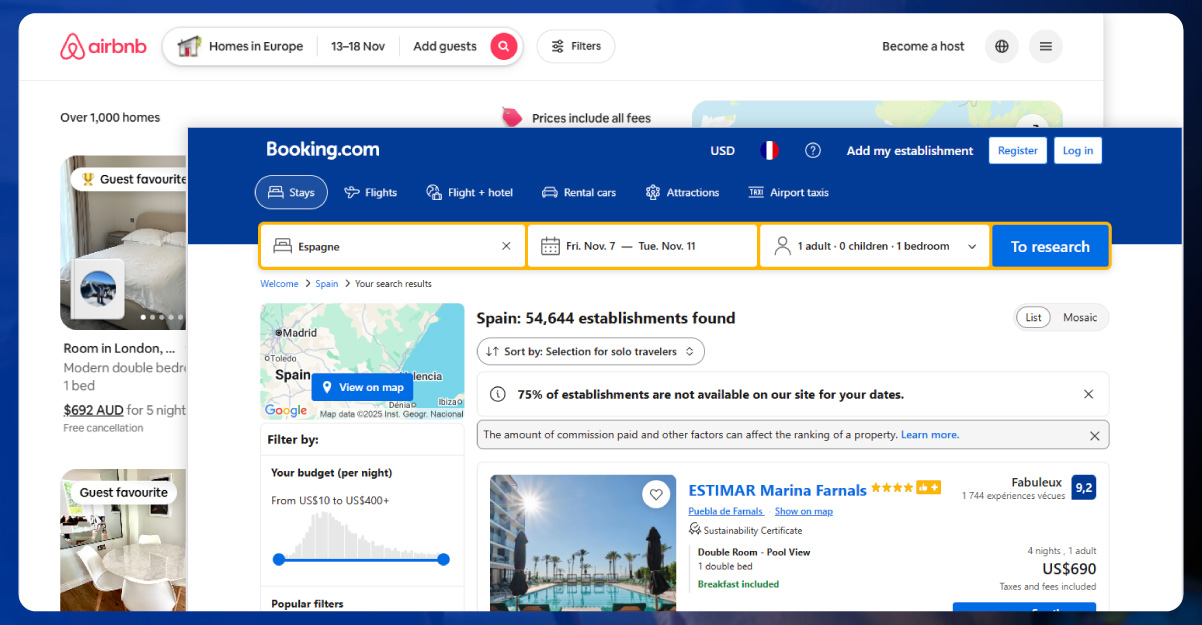
Winter tourism is no longer just about destinations; it’s about understanding the traveler’s journey through data. Platforms like Airbnb and Booking.com are digital treasure troves where every listing, review, and price change provides valuable insights. By monitoring and analyzing this information, businesses can spot new travel patterns and predict seasonal surges with precision.
For instance, in 2025, listings in Vienna, Munich, and Zurich are already seeing increased interest months before Christmas, while offbeat destinations like Tallinn and Krakow are gaining attention from travelers seeking affordable winter experiences. Extracting Europe hotel Data from Booking.com helps identify how hotels are adapting to these patterns by adjusting rates, adding festive packages, and promoting early-bird discounts.
The role of real-time Europe travel portal data scraping is to ensure that every shift in demand is captured instantly — whether it’s a sudden price surge before New Year’s Eve or an occupancy spike after a major holiday event. This real-time awareness is what sets successful travel brands apart from competitors who rely on outdated insights.
When comparing Airbnb and Booking.com data, fascinating trends emerge. Airbnb often dominates in destinations that prioritize local charm and personalized experiences. Booking.com, however, performs better in structured hospitality markets like Switzerland, Austria, and France, where hotels offer curated winter packages and luxury amenities.
Through Airbnb seasonal travel pricing data scraper insights, it’s evident that Airbnb hosts frequently adjust prices in real time — increasing rates during festive weekends and offering discounts in quieter weeks. Booking.com hotels, on the other hand, often use add-on strategies like “free breakfast” or “spa included” offers to attract winter tourists.
The diversity between these two platforms reflects a broader truth: travelers’ choices are evolving. Some prefer cozy, family-run apartments; others seek full-service resorts with all the comforts of a hotel. Together, their data creates a panoramic view of how winter tourism in Europe functions.
Airbnb and Booking.com winter travel insights reveal that certain destinations shine brightest during winter. Snowy cities like Vienna, Zurich, and Innsbruck continue to attract luxury travelers looking for alpine beauty. Meanwhile, budget travelers are discovering new charms in Krakow, Budapest, and Prague — destinations that combine affordability with festive appeal.
Interestingly, European holiday season travel portal scraping highlights a rise in southern European winter travel. Cities such as Lisbon, Madrid, and Athens are experiencing higher winter occupancy rates than ever before. Milder climates, cultural events, and affordable pricing attract digital nomads, retirees, and families seeking winter sunshine instead of snow.
At the same time, the Nordic regions — particularly Lapland in Finland and Tromsø in Norway — remain dream destinations for those seeking northern lights experiences. These seasonal booking trends, captured through continuous travel portal scraping for Europe’s winter destinations, offer a clear roadmap of evolving traveler priorities across the continent.
As traveler behavior changes overnight, static data no longer suffices. Real-time intelligence through process to Scrape Airbnb Travel Data gives businesses the power to react instantly. Travel companies can track which listings are filling fastest, which destinations are trending, and how host pricing strategies are shifting throughout winter.
Similarly, Booking.com Hotel Data Scraping Services reveal how hotels adjust pricing dynamically based on occupancy levels, demand, and competitor offers. This data helps businesses time their promotions better — for instance, offering early discounts in October or launching last-minute offers in mid-December to capture late travelers.
By consistently monitoring both Airbnb and Booking.com, brands can identify market gaps, understand traveler sentiment through review scraping, and optimize their listings or marketing campaigns accordingly.
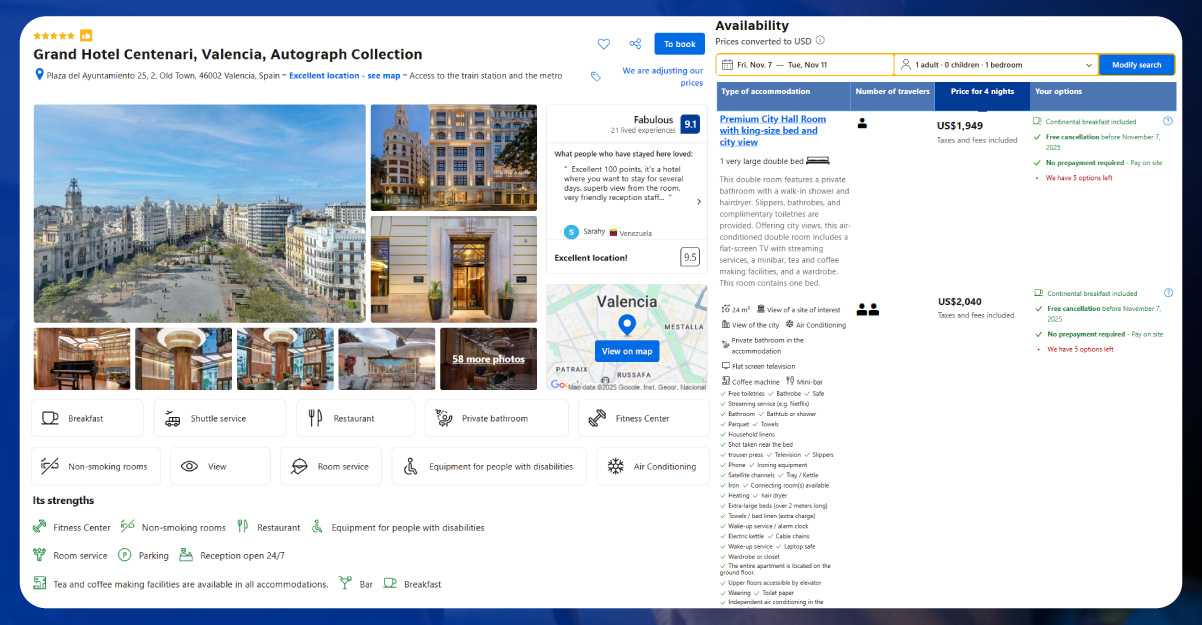
The insights from Airbnb Hotel Data Scraping Services uncover fascinating details about what travelers seek in winter. Comfort is king — properties with fireplaces, heating systems, or proximity to Christmas markets rank higher in reviews. On Booking.com, travelers prioritize full-service options such as spas, breakfast-included packages, and flexible cancellations, especially during uncertain weather conditions.
The rise in “slow travel” — where tourists spend longer in fewer destinations — also appears strongly in the data. Many travelers now prefer staying 5–7 nights in smaller towns or ski regions instead of hopping between multiple cities. This trend gives hosts and hotels the opportunity to attract guests through long-stay discounts or curated local experiences.
By integrating data scraping into their strategy, travel platforms can better cater to these emotional and behavioral nuances — offering guests exactly what they’re looking for.
Price remains one of the strongest motivators during winter travel planning. That’s where Airbnb vs Booking.com Price Comparison Services come into play. Comparing real-time pricing data between these two platforms allows businesses to maintain competitive rates, maximize occupancy, and avoid overpricing during quieter periods.
For example, if Airbnb listings in Vienna are sold out at premium prices, Booking.com hotels may strategically increase rates slightly to capitalize on the overflow demand. Conversely, if Airbnb rentals in Krakow drop in price, hotels might introduce value-add offers like airport transfers to attract bookings.
This interplay between platforms ensures that travelers always find options suited to their budget while businesses maintain profitability. Data scraping makes this balance possible, enabling continuous fine-tuning of pricing strategies throughout the winter season.
Unlock the power of travel intelligence—partner with us today to turn raw travel data into actionable insights that drive your winter season success across Europe.
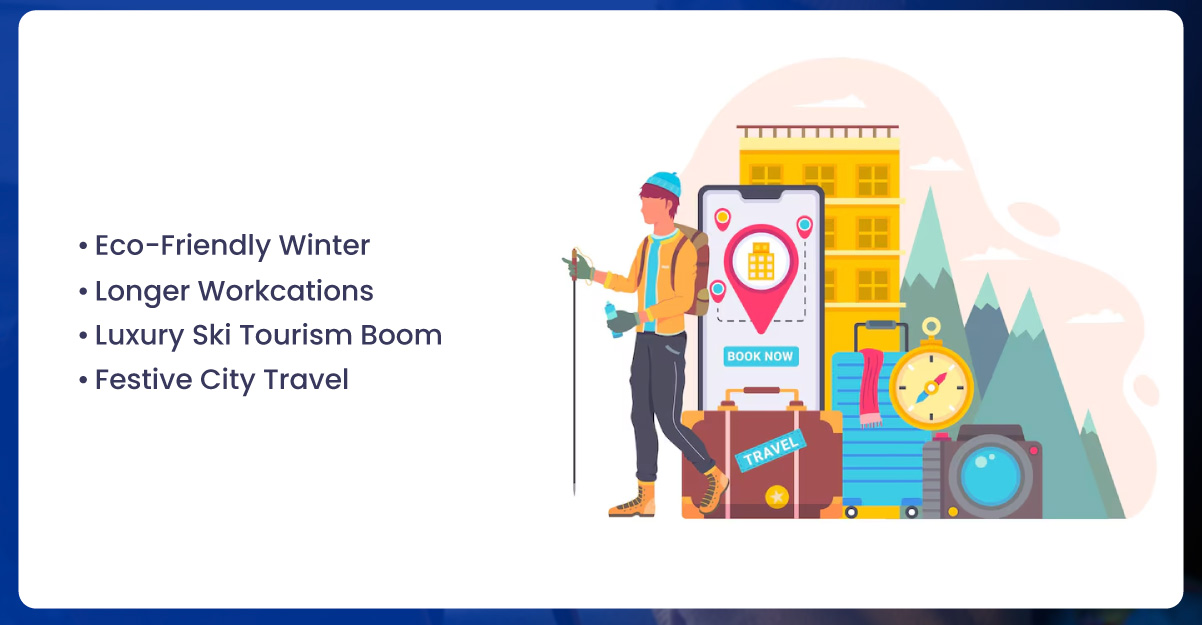
The early data for Europe’s 2025 winter travel season paints an exciting picture. Trends identified through continuous scraping reveal:
These patterns help travel companies plan marketing campaigns more effectively, knowing exactly when and where traveler interest peaks.
The true strength of data scraping is its predictive power. With enough historical and live data, travel brands can anticipate behavior before it happens. Using scraped insights, agencies can create personalized campaigns that recommend ideal destinations or stays based on real traveler interest.
For example, when Airbnb Hotel Data Scraping Services detect that bookings in Innsbruck are surging for late December, an online travel agency can instantly highlight nearby, less crowded destinations like Salzburg or Tyrol — offering travelers fresh alternatives and boosting conversions.
This ability to act quickly transforms how the travel industry operates. Instead of following trends, data scraping enables businesses to lead them.
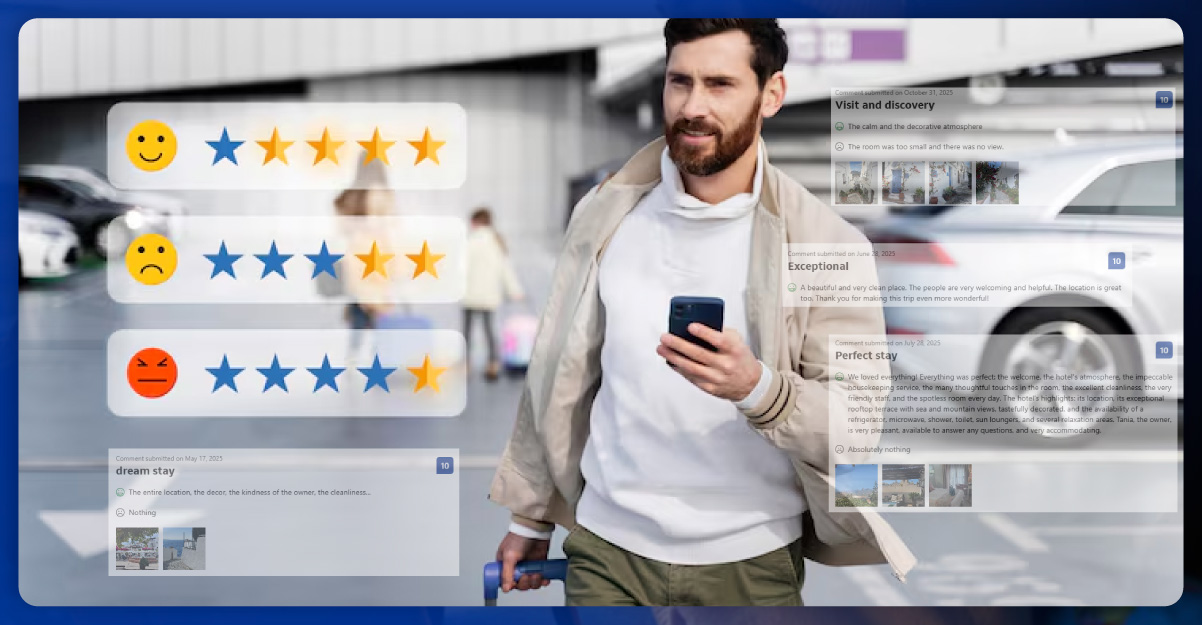
While data scraping primarily helps businesses, it also benefits travelers in profound ways. With tools like Booking.com Hotel Data Scraping Services, travelers enjoy more transparency — being able to compare deals easily, see real-time availability, and find accommodations that genuinely fit their needs and budgets.
Similarly, hosts use scraped market data to understand what amenities are most in demand — like hot tubs, mountain views, or pet-friendly spaces — and upgrade their listings accordingly. As a result, travelers get better, more personalized experiences.
The entire ecosystem using Booking.com Travel Dataset becomes more responsive, efficient, and traveler-centric thanks to the continuous flow of accurate, updated data.
As we head into another busy winter season, travel companies must realize that success depends not just on charm or location but on intelligence. By embracing advanced Airbnb vs Booking.com Price Comparison Services, they can remain agile in a fast-changing marketplace where demand fluctuates daily.
The insights derived from the Airbnb Travel Dataset serve as a compass for travel innovation. Together, they map how Europe’s winter travelers move, spend, and evolve — guiding businesses to adapt, personalize, and thrive.
Ultimately, data scraping isn’t just about numbers; it’s about stories — the couple finding their perfect mountain lodge in Austria, the solo traveler discovering hidden gems in Eastern Europe, or the family enjoying festive joy in Paris. Behind each of these experiences lies data — carefully scraped, analyzed, and transformed into the magic that keeps Europe’s winter travel alive year after year.
Experience top-notch web scraping service and mobile app scraping solutions with iWeb Data Scraping. Our skilled team excels in extracting various data sets, including retail store locations and beyond. Connect with us today to learn how our customized services can address your unique project needs, delivering the highest efficiency and dependability for all your data requirements.